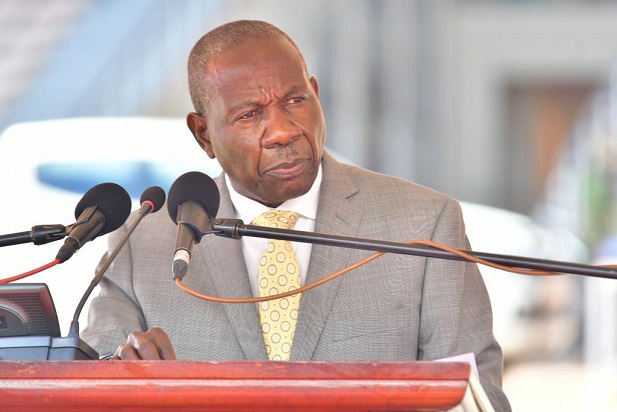Finance Minister Matia Kasaija
Parliament’s Budget Committee has queried the conflicting public debt figures submitted to the House by two government entities.
In the committee report on the proposed National Budget Framework paper for the next financial year 2023/2024, Members of Parliament queried the variance in figures submitted by the Ministry of Finance and Auditor General.
According to the National Budget Framework Paper presented by Finance Minister Matia Kasaija, the stock of public debt increased from 71.63 trillion in June 2021 to 78.83 trillion Shillings in June 2022.
As a share of Gross Domestic Product (GDP), public debt increased from 46.9 percent to 48.4 percent over the same period and the Public debt is projected to peak at 53.1 percent in June 2023. For a debt to be sustainable, particularly for developing countries of which Uganda is part, the International Monetary Fund-IMF says it must not exceed 50 percent of the country’s Gross Domestic Product-GDP.
However, according to Auditor General’s report on financial statements for the financial year 2021/2022, the reported total public debt as of 30th June 2022 stood at 86.6 trillion of which the domestic debt stock was 38.1 trillion and the external debt stock was valued at 48.5 trillion.
The Bank of Uganda Deputy Governor, Micheal Atingi-Ego recently reported to Parliament’s Finance Committee that the country’s public debt had hit 80 trillion Shillings as at end of September 2022.
“From the analysis, it is clear that there has been a consistency increase in total debt as evidence by an increase of 109 percent in the five years from the financial year 2017/2018 (41.4 trillion) to 86.6 trillion as of 30th June 2022. This trend in borrowing is characterized by higher domestic debt appetite that translates to crowding out the private sector from the credit market and consequently stifling private sector growth,” reads the Budget Committee report presented by Vice Chairperson Wamakuyu Mudimi.
Wamakuyu also reports that debt accumulation has been growing at an exponential rate while the growth rate of revenue has been growing at a much lower rate. He says that this situation suggests that the country’s ability to service debt in the medium term is untenable.
Wamakuyu recommended that government reconciles the reported amount of public debt stock, considering the conflicting figures from different institutions.
The Budget Committee report together with a minority Opposition report authored by Shadow Minister for Finance, Muhammad Muwanga Kivumbi, Shadow Minister for Science Innovations and Technology Gorreth Namugga and Buikwe South MP Dr Micheal Lulume Bayigga were tabled before parliament on Wednesday.
Deputy Speaker, Thomas Tayebwa deferred debate on the two reports to Tuesday next week.
Both reports questioned the consistent increase in the public debt, which trend is characterized by higher domestic debt appetite that stifles private sector growth.
In his report, Wamakuyu says that government should balance support for economic recovery and sustainable public debt while reducing reliance on domestic borrowing to alleviate crowding out private sector financing. He says that the reduced amount of expensive domestic borrowing and the prioritization of concessional financing over the medium term will help keep debt sustainable.
Kivumbi, the Shadow Minister for Finance, proposes that the country comes up with a mechanism for reducing the debt burden. Kivumbi suggests a Debt Fund be set up where an agreed sum of money is reserved especially for debt financing and that this can be done for o period of five years.
“We also propose putting a cap on Government expenditure for a period of three years. Government must reduce unnecessary expenditure that leads to borrowing. We should also avoid consumptive loans and put emphasis on productive loans for development,” Kivumbi said.
The opposition also wants parliament to set aside time to debate the country’s debt burden.
In the next financial year 2023/2024, domestic refinancing is projected to increase from 8 trillion to 8.7 trillion Shillings representing an increase of 790.9 billion Shillings.
According to the Opposition in Parliament, this is very costly for the country and the government cannot continuously borrow to pay domestic loans.
“The interest payments increase each time borrowing takes place. Currently, the interest payments for Uganda’s debt increased by 1.4 trillion from 4.6 trillion in the current financial year 2022/2023 to 6.1 trillion in the next financial year 2023/2024,” reads the minority report.
The Opposition says that the high-interest payment explains why the country’s discretionary resource envelope shrank.
The proposed budget for next financial year 2023/2024 is projected at 49.98 trillion, compared to 48.13 trillion for the current financial 2022/2023, reflecting an increase of 1.85 trillion. However, whereas the resource envelope has increased, the discretionary resource envelope reduced by 2.53 trillion due to the projected increase in the interest obligations and obligation to settle Bank of Uganda borrowing.
The opposition minority report argues that the 6.1 trillion Shillings for interest payments next financial year is enough to cover the proposed budget allocations for six out of the 20 programmes.
The programmes are agro industrialization (1.4trillion), Mineral Development (38.5 billion), Sustainable Petroleum Development (539.2 billion), Manufacturing (268.4 billion), Tourism Development (89.2 billion), Natural Resources, Environment, Climate Change, land and Water ( 546.3 billion) and Digital Transformation (176.7 billion).
For the main Budget Committee report, it recommends that government reduces its appetite for domestic borrowing and increases access to long-term finance, through among other measures deepening capital markets to widen investment opportunities, promoting retirement benefits, and further capitalization of development finance institutions like the Uganda Development Bank (UDB).
“The private sector in Uganda is mostly comprised of Micro Small and Medium Enterprises (MSMEs) which collectively constitute approximately 90 percent of private-sector production and employ over 2.5 million people. The cost of doing Business remains high. Some of the factors attributed to the high cost of doing business in Uganda include; persistently high lending rates-partly due to increased domestic borrowing by Government,” further reads the Budget committee report.
The other factors attributed to the high cost of doing business are risk aversion by banks due to the poor performance of many businesses, high energy tariffs, bureaucratic business registration processes, inadequate skilled labour force, limited knowledge of business formalization procedures, and high transport-related costs.
-URN





